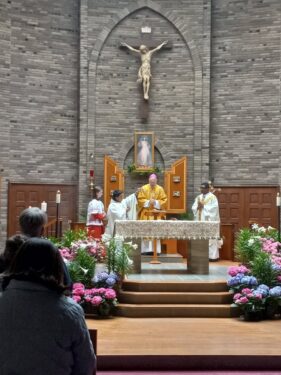
By Armando Machado, OSV News
NEW YORK (OSV News) — At the New York archdiocesan Family Life Conference, speakers and organizers sought to help participants better understand the importance of family in our world today, “expanding our vision as to what we can do to help families grow in faith,” said Ted Musco, director of the Office of Family Life, sponsor of the second annual gathering.
The conference took place April 13 at the Church of the Transfiguration in Tarrytown, conducted both in English and Spanish. About 150 people attended part or all of the daylong gathering.
“Having a home and being able to come home again in the course of your life — even if you are far away from home — is the blessing of a real family,” said keynoter Bishop Franz-Peter Tebartz-van Elst, delegate for catechesis in the first section of the Vatican Dicastery for Evangelization. The first section, regarding evangelization in the world, is the successor to the former Pontifical Council for Promoting New Evangelization.
The bishop’s talk was titled “Family and Catechesis: Challenges and opportunities in a changing world.”
“Young people break away and often do so at the point that is particularly important to parents,” Bishop Tebartz-van Elst said, citing the importance of ongoing child faith formation well into the teen years. In asserting his points, the bishop, a pastoral theorist, occasionally used the words of prominent writers, thinkers and theologians, including St. Paul, Franz Kafka, and Pope Francis. He also regularly cited the Vatican’s 2020 Directory for Catechesis, which gives guidelines for catechists and pastors particularly in the role of evangelization.
“Catechesis in the family establishes an awareness of the beginning,” he noted, adding, “Every ability to speak in faith needs a contemplative context, and ultimately language and prayer can only emerge from silent amazement.”
The bishop noted that when the personal development of youth “is driven by political and social ideology, there seems to be an increasing need for the contrasting basic understanding of family that the Directory for Catechesis takes as a basis for catechesis when it points out possibilities for an effective transmission of the faith.”
Bishop Tebartz-van Elst later celebrated both a late morning and late afternoon Mass.
“This temple of love, the family — the tradition understands it as a domestic church: prayer at home, Sunday worship, sacramental life, reading the Word together,” said another speaker, Hosffman Ospino, chairman of the Department of Religious Education and Pastoral Ministry at Jesuit-run Boston College. During his talk, he also noted that Christian families should engage in practices “to build the common good; the family exists in order to give witness to the world … witnesses of self-giving love (through service).”
Ospino, citing the importance of catechism and family life, said spouses should consider themselves responsible for each other’s “holiness and salvation,” and for the holiness and salvation of their children. “So, there is an ethical responsibility in this context of love, in the context of the home,” he said. “The primary responsibility of a Christian parent is to ensure that their children are holy.”
Guadalupe Ospino, National Family Life and Hispanic Ministry speaker (and wife of Hosffman), simultaneously gave the same talk in Spanish in another part of the parish grounds.
Also giving talks affirming the mission of the Office of Family Life were: Riquelmy Lamour, licensed clinical social worker and mental health professional; Jimmy Walters, speaker and author of “Fatherhood and Mission”; and Robin Klueber, regional specialist serving parishes in Manhattan, Department of Youth Faith Formation of the Archdiocese of New York.
“These themes are critical — catechism and family life. The family is the essence of civilization,” Monique Kozlowski, a conference attendee, said during a break. She told The Good Newsroom, New York’s archdiocesan online news outlet, that she very much appreciated the bishop’s message of “how our faith has to be spread through the Word, and also the message of listening.” Kozlowski was with her husband, Jan. They are Transfiguration parishioners who have five children and two grandchildren.
Rafael Polanco and his wife, Nuris, also were among the attendees. “We’re here because of the theme of this event — the family, and how the church helps form the family. Everything that helps us grow in our faith is of interest to us,” Polanco said. Parishioners of St. John Chrysostom Church in the Bronx, Polanco and his wife have two children.
